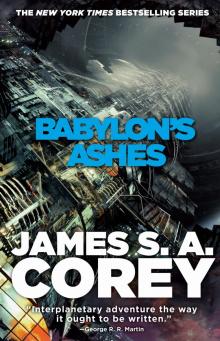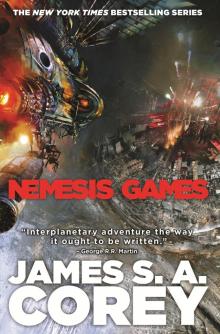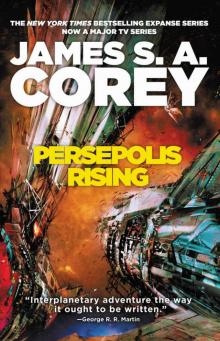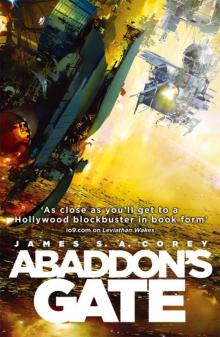- Home
- James S. A. Corey
Cibola Burn (Expanse) Page 28
Cibola Burn (Expanse) Read online
Page 28
Her expression was calm, her tone matter-of-fact. She wasn’t boasting. If anything, he thought there was a hint of apprehension in her voice. It disturbed him more than the acting captain’s list of threats.
He closed the scheduling grid, considered his hand terminal for a few seconds. It would be afternoon on the surface, a little over halfway through one of the long, fifteen-hour days.
“Excuse me,” he said to the prisoner. “I’ve got to make a call.”
He thumbed the privacy controls down, and the steel mesh of the cage deformed into a pearly opacity. He requested a connection to Murtry, and a few seconds later his boss appeared on the screen. The sun had darkened his skin, and a tiny scab on his forehead looked almost like a caste mark. He nodded to Havelock.
“What can I do for you?” Murtry said.
“I wanted to touch base with you about the prisoner,” Havelock said. “Check our strategy.”
“Saw the pilot’s little tantrum, did you?”
“You know, boss, all that you said before about how they have the biggest guns and if they want to take us down, they can? Because that’s still true.”
In the background of the feed a door slammed, and Murtry looked up, nodded, and refocused on Havelock. “Less an issue now than ever. As long as one of theirs is on the ship, they won’t shoot.”
“Won’t?”
“Will be less likely to,” Murtry amended.
“And what’s the plan when RCE orders us to release her?” Havelock said. “It might be worth cutting her loose early. Get out in front of it, get some goodwill back.”
“We’re way past goodwill.”
“I’m just not sure we have the authority to hold her, and if —”
“Are you in her brig?”
Havelock blinked. “Sorry?”
“Are you in her brig?”
“No, sir.”
“Right. She’s in yours. You have the jail and you have the pistol, that makes you the sheriff,” Murtry said. “If the home office doesn’t like what we’re doing, we’ll appeal the decisions. If we lose the appeal, they can send someone out and have a meeting face-to-face. By that time, all this will look so different they might as well not try. And the home office knows that, Havelock. What we’ve got here is a very free hand.”
“Yeah. All right. I just wanted to check.”
“My door’s always open,” Murtry said in a voice that meant maybe Havelock shouldn’t bother him with any more stupid ideas. The connection dropped, and Havelock considered the default screen for a few seconds before he pulled the grid back up. A few seconds later, he deactivated the privacy shield. Naomi was floating in the cage, pushing herself from side to side like a bored kid.
“Your privacy equipment sucks,” she said.
“Really?”
“Really.”
“You heard that, then?”
“ ‘A very free hand,’ ” she said.
“Sorry. That was supposed to be between me and him.”
“I know, but it came right through. Honestly, can you hear me peeing in here?”
“Just that the vacuum comes on,” Havelock said, feeling a little blush in his neck and a sharp embarrassment at being embarrassed. “It’s pretty loud.”
“Old ships,” she said.
He went back to the business of running his staff. A report came in complaining of theft from one of the ship technician’s personal lockers. He routed it to the woman on duty. As long as things stayed pretty calm and the crew was all focused on the dangers outside, he could hold the place together. Having a common enemy actually helped with that. A lot of common enemies. Naomi started humming to herself, a soft melody that hovered just on the edge of recognizable. Havelock let himself enjoy it a little. It was that or be annoyed.
“He wasn’t the only one,” he said.
“Sorry?” Naomi said.
“He wasn’t the only one who got off Eros during the outbreak. My old partner was there. He got off too. Then he went back later. When it hit Venus.”
“Wait. You knew Miller?”
“Yeah,” Havelock said.
“Small universe.”
“He was one of maybe six decent people working Ceres Station when Star Helix had the contract. Warned me to quit Protogen before they imploded too. I was sorry about it when he died.”
“He’ll be flattered,” she said.
“We’re not the bad guys here. RCE didn’t start any of this. You said you liked Holden because he always does what he says he’ll do? That’s us. RCE are the ones who asked permission and made a plan and came out here to do what everyone agreed we should do.”
“Not the people in First Landing. They didn’t agree.”
“No, because they were breaking the rules that we were following. I’m just… I know how weird and dangerous this all is, but before your friends start blasting rail gun rounds through our reactor, I want you to see that we’re not the bad guys here.”
His voice had gotten thinner and higher as he spoke. At the end, he was almost shouting. He pressed his hands together. Bit his lips.
“Under a little pressure,” she said.
“Some,” he agreed.
“Let me out, I’ll put in a good word for you,” she said. “And it’ll keep Holden from doing anything stupid.”
“Really?”
“It’ll keep him from doing a couple particular stupid things,” she said. “He may come up with something else. He’s clever that way.”
“I can’t,” he said.
“I know.”
The ship passed invisibly into the planet’s shadow, the decks clicking and groaning as the expansion plates adjusted to the change in radiant heat. Havelock felt a little rush of shame. She was his prisoner. He was the jailer. He shouldn’t need her approval. If she thought he and his people were baby-killing fascist power freaks, it didn’t change anything he had to do. Naomi went back to humming. It was a different song now. Something slow, in a minor key. After a while, she let it drift into silence.
“They weren’t the only ones,” she said as he finished the week’s duty roster. “They were the only ones that were trapped in the outbreak, but the place was locked down before that. A bunch of thugs in stolen riot armor making sure everyone did what they were told, and shooting the ones who didn’t. Getting ready for it. A few people made it past them.”
“Really? Who?”
Naomi shrugged.
“Me,” she said.
Chapter Twenty-Seven: Elvi
E
lvi sat on the crest of the hill, looking west. The morning light behind her caught the wings of thousands of butterfly-like animals. She hadn’t seen them before, but today they filled the air from the ground to twenty meters high. A vast school of tiny animals. Or insects. Or whatever other name humanity eventually assigned to this foreign kingdom of life. For her, right now, they were butterflies.
They moved together like a school of fish, independent and coherent. Bursts of color – blue and silver and crimson and green – flashed through them, seeming almost to come in patterns for a moment and then dissolving into chaos. The column of them rose, narrowing, then broadened and flattened. They moved past her in a rush, and for a few seconds she was inside the cluster, palm-sized wings fluttering gently against her with a sound like sheets of paper falling and a clean, astringent smell like mint without being mint. She smiled and raised her arms up into the cloud of them, taking joy in the beauty and the moment, and then they passed, and she turned to watch them flow through the air, tumbling to the south as if they were going somewhere in particular.
She stood and stretched, adjusting her collection satchel against her hip. The sunlight pressed against her shoulders and the nape of her neck as she walked forward into the dusty, stone-paved field. The ruins rose to the north, with First Landing not even a smudge next to them, all human artifacts hidden by the curve of the planet and the shape of the hills. All except her.
Here and there, a few butte
rflies remained, possibly dead. Possibly quiescent. She squatted beside one, looking into the vibrant blue of its wings, the coppery complication of flesh where its body – what she thought of as its body – folded together, interarticulated like a hinge. She put on her gloves and lifted the tiny body. It didn’t so much as flutter. Even though it meant getting less physiological data, she hoped it was already dead.
“Sorry, little one,” she said, just in case. “It’s in the name of science.”
She folded it into the black lattice, sealed it, and triggered the collection sequence. The array of sampling needles clicked and muttered to themselves. Elvi squinted up into the white-blue arch of the sky. The red dot floated about fifteen degrees above the horizon, bright enough to show through the thin, greenish clouds.
The satchel coughed, throwing out an error code Elvi hadn’t seen before. She took out her hand terminal, connecting it to the satchel’s output channel. The preliminary dataset was a mess. Elvi felt a deep, cold stab of fear. If the satchel was broken, it could take days before the one functioning shuttle could bring her a spare from the Israel. She wasn’t even positive they had a spare in the toolkit or if they’d all been lost in the wreck of the heavy shuttle. The prospect of years going by collecting data by hand and spending her nights doing dissections like she was back in lower university reared up like a ghost. She took the butterfly out. Its corpse looked almost the same as when she’d put it in. She sat cross-legged beside it and ran the satchel’s system diagnostics, chewing her lips as she waited for a fresh error code.
The readout came up clean. She looked from the satchel to the butterfly, then back again. A second hypothesis formed, as chilling as the first. Maybe worse. She picked up the dead butterfly and marched back toward the huts. Fayez’s was a small green geodesic design he’d constructed halfway down a thin hill, high enough that any storm runoff would pass it by, but not at the crest where the wind would catch it. He was sitting on a stool, leaning back against the hut. He was wearing a pair of polyfiber work pants, a T-shirt, and an open bathrobe. He hadn’t shaved in days, and the stubble on his cheeks made him look older.
“This isn’t an animal,” she said, holding out the butterfly.
He let the stool come down, its legs tapping the ground. “Good to see you too,” he said.
“This isn’t two biomes coming together. It’s three. This… whatever it is? It doesn’t have any of the chemical or structural commonalities that you’d expect to see.”
“Lucia Merton was up looking for you. Did you run across her?”
“What? No. Look, this is another machine. It’s another thing like” – she pointed at the low red moon – “like that.”
“All right.”
“What if they’re really not coming awake just because we’re here? What if they’re consistent? It complicates everything.”
Fayez scratched his scalp just above his left ear. “You seem to want something here, Elvi, but I don’t know what it is.”
“How am I supposed to make any sense of this place when it keeps changing all the rules?” she said, and her voice sounded shrill even to her. She threw the butterfly down angrily, then immediately wished she hadn’t. Not that it cared, just that the gesture seemed cruel. Fayez smiled his sharp little smile.
“You’re preaching to the choir. You know what I’ve been doing all morning?”
“Drinking?”
“I wish. I’ve been going over surface data from the Israel. There’s a chain of islands on the far side of the planet with what looks like a metric ass-ton of volcanic activity. Only so far as I can tell, this planet doesn’t have, you know, tectonic plates. So what the hell is mimicking vulcanism? Do you know what Michaela’s working on?”
“No.”
“There’s a pattern in the ultraviolet light that reaches the ground here, like it’s some kind of carrier signal. Doesn’t exist before the sunlight hits the exosphere, and by the time it comes here, complex, consistent patterning. She’s got no idea where it’s coming from. Sudyam’s workgroup has what they think might be complex molecules that incorporate stable transuranics.”
“How does that work?”
“I know, right?” Fayez said.
Elvi hung her hand on her shoulder, letting her elbow hang loose. Sweat trickled down her spine.
“I have to —”
“— tell Holden,” Fayez said. “I know.”
“I was going to say ‘review my data.’ See if maybe there’s a common structure between that” – she nodded at the butterfly – “and the big thing in the desert. Maybe I can make sense of it.”
“If you can’t, no one can,” Fayez said.
Something in his voice caught her attention, and she looked at him more closely. His fox-sharp face looked softer around the eyes and jowls. The flesh around his eyes was puffier than usual. “Are you all right?”
He laughed and spread his arms toward the horizon, gesturing at the whole planet – the whole universe – at once. “I’m great. Just spiffy. Thanks for asking.”
“I’m sorry. I just —”
“Don’t, Elvi,” he said. “Don’t be sorry. Just go on dealing with all of this the way that you do. Pile on another few layers of not thinking about it, and sail on, my dear, sail on. Whatever keeps you sane and functioning in a place like this, I will carry a flag for it. I’ll even pray with Simon on Sunday mornings. That’s how bad I’ve got it. Whatever works for you has my blessings.”
“Thank you?”
“Afwan,” he said, waving his hand. “Only before you bury your head back in your datasets again? Go see Doctor Merton. She looked worried.”
The boy sitting on the clinic table was six years old. His skin was the same deep brown as Elvi’s own, but with an ashy color to it. Not dryness, but something deeper. His eyes were bloodshot like he’d been weeping. Maybe he had been. His mother stood in the corner, her arms crossed and a vicious scowl on her lips. Lucia’s voice was crisp and calm, but her shoulders rode high up beside her ears.
“So I’m seeing this here,” she said, as her finger pulled down on the boy’s cheek, opening a thin gap between the lower lid and the roughened surface of the eyeball. The discoloration was almost invisible in the redness, but it was there. The faintest hint of green.
“I see,” Elvi said. She smiled at the boy. He didn’t smile back. “So, Jacob —”
“Jason.”
“Sorry. Jason. How long have you had trouble seeing things?”
The boy shrugged. “Right after my eyes started hurting again.”
“And everything looks… green?”
He nodded. Lucia touched Elvi’s arm. Silently, the doctor shone a light into the boy’s eye. The iris barely reacted, and Elvi caught a glimpse of something in the fluid behind the boy’s cornea, like a badly maintained aquarium. She nodded.
Lucia stood up, smiling at the woman. “If you’ll wait with him here, Amanda. I’ll be right back.”
Amanda nodded once, sharply. Elvi let Lucia draw her through the examining room door and down a short hallway. Outside, a stiff breeze had picked up, rattling the clinic’s doors and windows.
“He’s the only one I’ve seen like this,” Lucia said. “There’s nothing in the literature.”
“His mother doesn’t seem to like me very much,” Elvi said, trying to make it a joke.
“Her wife was shot and killed by RCE security,” Lucia said.
“Oh. I’m sorry.”
The testing array was good, but it was old. Ten years, maybe fifteen. A long scar ran across the bottom of its screen where something had gouged at it. Elvi could believe it had made the long trek from war-torn Ganymede to come here. She was surprised it still worked, but when Lucia thumbed in her access code, the screen came to life. The sample was beautiful in its way. A branching of elegant green like a pictogram meaning tree.
“It began in the extracellular matrix,” Lucia said. “Low-level inflammation, but nothing worse than that. I hoped it would cl
ear up on its own.”
“Only now it’s in the vitreous humor,” Elvi said.
“I was wondering…” Lucia began, but Elvi had already taken out her hand terminal and started syncing it to the array. It only took a few seconds to find a match. Elvi tapped through the data.
“All right,” she said. “The closest match is some of the rainwater organisms.” Lucia shook her head, and Elvi pointed up. “You know how the clouds are greenish? There’s a whole biome of organisms up there that have found ways to exploit the moisture and high ultraviolet exposure.”

 Leviathan Wakes
Leviathan Wakes Gods of Risk
Gods of Risk Babylon's Ashes
Babylon's Ashes Expanse 03 - Abaddon’s Gate
Expanse 03 - Abaddon’s Gate Tiamat's Wrath
Tiamat's Wrath Persepolis Rising
Persepolis Rising The Butcher of Anderson Station
The Butcher of Anderson Station The Churn
The Churn Expanse 05 - Nemesis Games
Expanse 05 - Nemesis Games Strange Dogs
Strange Dogs Honor Among Thieves: Star Wars
Honor Among Thieves: Star Wars Cibola Burn
Cibola Burn Caliban's War
Caliban's War The Vital Abyss
The Vital Abyss Auberon
Auberon Persepolis Rising (The Expanse)
Persepolis Rising (The Expanse) Caliban's War: Book Two of the Expanse series
Caliban's War: Book Two of the Expanse series Leviathan Wakes: Book One of The Expanse
Leviathan Wakes: Book One of The Expanse Cibola Burn (Expanse)
Cibola Burn (Expanse) Strange Dogs (Expanse)
Strange Dogs (Expanse) The Vital Abyss: An Expanse Novella (The Expanse)
The Vital Abyss: An Expanse Novella (The Expanse) Leviathan Wakes e-1
Leviathan Wakes e-1 Abaddon's Gate e-3
Abaddon's Gate e-3 Caliban;s war e-2
Caliban;s war e-2 Gods of Risk: An Expanse Novella
Gods of Risk: An Expanse Novella Honor Among Thieves: Star Wars (Empire and Rebellion)
Honor Among Thieves: Star Wars (Empire and Rebellion)